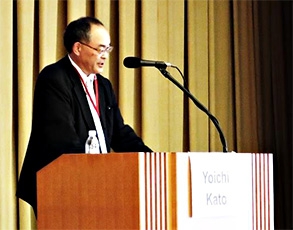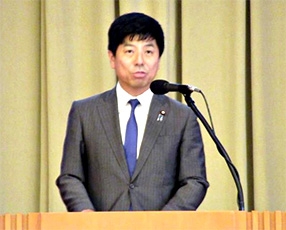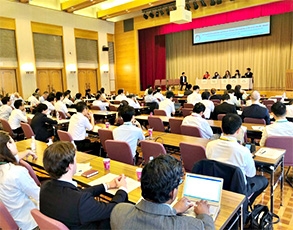Climate Change
International Conference on Climate Change and Fragility in the Asia-Pacific Region
- Interlinkage among Science, Regional Studies and Business from the Perspective of Long-term Climate Risks



The Ministry of Foreign Affairs held the International Conference on Climate Change and Fragility in the Asia-Pacific Region at the Mita Kaigisyo (Mita Conference Center) in Tokyo, Japan, on July 12, 2018. More than 130 including corporate executives, professionals and risk managers with businesses or investments throughout the region, climate researchers, regional experts, development assistance professionals, Japanese NGOs and think tank representatives, and government representatives participated in the Conference and engaged in active discussion on challenges posed by climate risks in the region, and how countries and regions would ensure sustainable development of their economy and society while addressing such challenges as rapid urbanization, movement of people, extreme weather events and food insecurity.
1. Background and the objective of the conference
Climate change is considered as one of the most serious challenges that pose threats to global security and economic prosperity. The G7 Foreign Ministers have been discussing this topic since 2013, through working group on climate change and fragility. The G7 Hiroshima Foreign Ministers' Meeting in 2017 recognized the urgency of addressing climate-fragility risks and stressed the importance of aligning efforts on foreign policy towards the common goal of reducing the risks in order to increase resilience against global climate change.
The Ministry of Foreign Affairs of Japan organized a roundtable seminar on climate change and fragility implications on international security in January 2017 and its follow-up review meetings. The seminar and meetings proposed such actions as:
- - study and discuss climate change and fragility in Asia and Pacific region;
- - explore concrete approaches to be taken by the government; and
- - make proposals to the related G7 Foreign Ministers' meetings.
As a follow up, Japan submitted the report about analysis on climate change impacts to natural disasters in Asia and Pacific region and correlation with socioeconomic fragility in the region at the working group held in Rome in October 2017 to the G7 Italian presidency. The findings of report were also shared at COP23 Preparatory Workshop in Suva, Fiji as well as COP23 in Bonn, Germany.
At this International Conference, taking into account the 2017 report as well as feedback and comments given at various occasions including follow-up meeting of experts on March 28, 2018, the participants discussed various aspects of fragility and security, risk management of companies in the regions and investment risks brought by climate change with particular emphasis on extreme weather events and resilient infrastructure. Participants explored approaches/actions which central/local governments, and companies, think tanks, researchers and civil society could take to address potential risks in the future through considering scenarios.
2. Overview of the Conference
- Date and times:
- 10:00 - 16:00 JST on July 12, 2018
- Venue:
- Mita Kaigisyo (Mita Conference Center), 2-1-8 Mita, Minato-ku, Tokyo 108-0073, Japan
- Participants:
- Corporate executives, professionals and risk managers with businesses or investments throughout the region, climate researchers, regional experts, development assistance professionals, Japanese NGOs and think tank representatives, and government representatives (from the capital Embassy) (more than 130 for total)
- Working language:
- English (no interpretation service available)
- Morning (open to press)
-
- (1) Opening
- Mr. Kazuyuki NAKANE, State Minister for Foreign Affairs
- (2) Keynote speech
- Mr. Yoichi KATO, Senior Research Fellow, Asia Pacific Initiative (former national security correspondent of Asahi Shimbun and bureau chief of American General Bureau in Washington, DC.)
- Mr. Kato described how climate change was discussed in the context of international security. Using the example of the developments in the Arctic, Mr. Kato pointed out that climate change had impact on global landscape of geopolitics and economy, thus creating potential source of instability.
- (3) Panel discussion 1
-
- Mr. Alexander CARIUS, Managing Director, Adelphi
- Dr. Yasuko KAMEYAMA, Deputy Director, Center for Social and Environmental Systems Research, National Institute for Environmental Studies, Japan (NIES)
- Ms. Mari YOSHITAKA, Chief Environmental & Social Strategist, Environmental Strategy Advisory Division, Mitsubishi UFJ Morgan Stanley Securities Co., Ltd.
- Dr. Megumi MUTO, Deputy Director, Global Environment Department, Japan International Cooperation Agency (JICA)
- Dr. Daisaku HIGASHI, Professor, Center for Global Education and Discovery, Sophia University
- In the panel discussion 1, the panelists discussed various aspects of fragility and security risks arising from climate change. They also pointed out various challenges related to risk management of companies in the regions and investment risks induced by climate change with particular emphasis on extreme weather events and resilient infrastructure.
The panelists explored approaches and actions which stakeholders can take to address potential risks in the future through wide-ranging climate actions from collaboration within the United Nations system, climate finance, corporate disclosure to effective adaptation measures incorporating business activities.
- Afternoon
-
- (4) Breakout session (closed)
- The participants discussed the importance of dealing with the long-term climate risks in an interactive scenario exercise. In this interactive session, the participants were given a scenario set in near future in Southeast Asia or Pacific Islands and discussed how to deal with possible climate-change-affected natural disasters and long-term risks in small groups. This interactive exercise provided participants with an opportunity to discuss the nexus between climate change and fragility from diverse point of view. The scenarios are attached to the Conference summary.
- (5) Panel discussion 2
-
- Ms. Fetoloai YANDALL-ALAMA, Assistant Chief Executive Officer, Ministry of Natural Resources and Environment, Samoa
- Dr. Sudhiani PRATIWI, Deputy Director for Climate Change and Environmental Quality, Directorate for Environmental Affairs, Ministry of National Development Planning, Indonesia
- Ms. Sally YOZELL, Senior Associate & Director, Environmental Security Program, The Stimson Center
- Dr. Koji DAIRAKU, Senior Researcher, National Research Institute for Earth Science and Disaster Resilience (NIED)
- Ms. Miho KUROSAKI, Head of Japan and Korea Research, Bloomberg New Energy Finance
- The panelists deliberated on what needs to be further examined when incorporating climate change measures in regional policies and/or business strategy and what roles scientific data should play.
- (6) Closing
3. Achievement and key findings
- (1) Both climate change experts and corporate representatives attended the conference and actively discussed the recent trend of climate change and its complex challenges. Through the one-day conference, it was recognized that climate change affects not only the environment but has significant impact on economy, society and global security. The scenario exercise in the breakout session provided an opportunity for the participants to examine impacts that long-term climate risks have on socio-economic development of countries and region from various points of view.
- (2) Many participants made positive comments on the approach taken by the Conference which gathered experts from a broad range of specialization related to climate change. The participants commented that they were able to examine climate change from a new perspective as they were able to interject with experts on various fields such as natural science, regional studies, business and investment. Other attendees pointed out that that they could have better appreciation on what kind of role scientific data evidence can play in providing basis for stakeholders when they make important policy decisions and business strategy.
- (3) In order to take effective climate action, it is imperative that stakeholders on any given issues related to climate change have critical awareness and sense of urgency. They also need to appreciate the opportunity for economic growth provided by robust actions taken in order to assess climate change. At various international fora such as G7 or G20 meetings, active discussions are underway to link climate change and global security as well as efforts to connect climate change measures to the promotion of economic growth. The Ministry of Foreign Affairs intends to make the best use of views and feedback acquired through the Conference for the future international discussions especially in G20 in 2019 which Japan will serve as the presidency.
Note: the programme of the Conference, list of participating organizations and two scenarios used in the breakout session are attached to the summary



 (Open a New Window)
(Open a New Window)